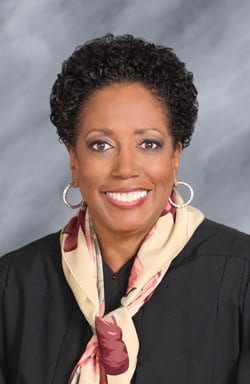

This portrait of Judge Judith Dilday is displayed in a Cambridge courtroom.

This portrait of Judge Judith Dilday is displayed in a Cambridge courtroom.
Judge Judith Dilday is having the time of her life exploring the world – and spoiling her grandchildren
“The aspect of being ‘first’ isn’t necessarily fun,” said former Massachusetts Probate and Family Court Circuit Judge Judith Nelson Dilday.
But Dilday has had a lot of firsts.
She was the first African American woman to serve on the probate and family court in Massachusetts; the first black woman to work at the district attorney’s office and she co-founded the first African American female-owned law firm in the state — Burnham, Hines and Dilday — before serving on the bench. Though her career has been built on “firsts,” she doesn’t appear to be caught up in the hype usually assigned to trailblazers.
“I did what I was doing at the time,” she explained. “Sometimes you feel like you’re beating your head against the ceiling. But when teachable moments arose, I would try and slip something in. There were a lot of teachable moments.”
She hails from Pittsburgh — now known for its hard won rebirth after the end of the manufacturing boom — where she grew up surrounded by family with strong beliefs about the importance of education.
“My family believed that education is the savior for our race,” Dilday said.
She received her undergraduate degree in French from the University of Pittsburgh in 1966 and was a public school teacher for four years in her hometown. Growing up her mother told her that she should be a lawyer.
“ ‘Me?’ I used to say. I didn’t see that in myself,” she recalled.
After teaching, Dilday wanted a change of scenery, a new start. She packed up her things and headed to Boston. When she got here, Dilday found herself in uber-educated social circles. She quickly decided to go back to school. She contemplated getting a master’s in French, but later decided against it and headed to law school.
“Law school was very frightening,” she said. “There are no tests until the end of the year so I kept wondering if I was doing enough or doing it right.”
Little by little, she finished up law school and landed a job at the district attorney’s office. By that time, she had met her husband James S. Dilday in law school and they were beginning to start a family.
“Socially, being the first black woman in the DA’s office was not always comfortable,” she said. “It got worse when I got pregnant. It was even hard to find maternity clothes. Women, especially pregnant women didn’t work in those days. People would see me in court and call me first. They wanted to get me out!”
Dilday spent 16 years on the bench before retiring in 2009. Since then, she’s been spending time doing whatever she wants to do. Dilday is an avid traveler whose attitude is to leave no stone unturned.
“My most recent trip was to Nevada, Utah and Arizona with my sister. It’s not to be missed. People traveled from all over the world to see it. It was worth it, she shared. “I want to step foot on every continent. I haven’t been to South America yet.”
There’s no doubt that Dilday will do everything she sets out to do.
Though she hasn’t been to South America yet, Dilday has been to China several times. Her first visit was in 2001.
“Chinese judges came here and visited our courts and studied our judicial system. The last few times I went to China, we did mock trials at the law school and explained how it all worked,” Dilday said.
On her second visit to China, Dilday was able to say a few things in the native tongue and impressed those she encountered.
Recently she took a six-month teaching gig in Qiqihar, China. The teaching job usually requires a year commitment, but Dilday was able to negotiate a shorter stay.
“I have a house, kids and a husband. I felt like a year was too long to be away from home,” Dilday said.
She intended to teach law, but ended up teaching English while living in Qiqihar, which is in the northeast above Siberia. It was winter going into summer while Dilday lived abroad and adjusted to life in another culture.
“It was colder than Boston. Everyone wears ski underwear there, so I got some,” she shared.
She took up Mandarin, dined religiously on her favorite dish of beef noodle soup made with broth, beef, yak bones and veggies and started mentoring her students formally and informally.
“The students were very nice and I enjoyed interacting with them,” Dilday shared.
Even though she’s returned to the states, Dilday, 68, continues to communicate with some of her former students.
China’s radically different government spawned spirited questions from the students that still reach out to Dilday.
“Some of them still e-mail me questions that I answered when I was there. When answering I have to think about where the questions are coming from so I can reasonably answer. The questions aren’t usually what they sound like,” she said.
Now that she’s back home, Dilday has started to focus on yet another goal.
“I’m taking writing classes. I like it. I like being forced to do it. I must produce,” she said.
Dilday has been exploring her family’s past. She is learning more about her grandparents who were part of the great migration. They were from Alabama and took the journey up north in search of a better life. They were servants who were listed as working for the wealthy and very influential Mellon family.
In addition to her writing and traveling, Dilday also sings in a gospel choir and answered the open call to join the steel band at church.
“I’ve always wanted to join the band. My sister is a professional singer and owns a company called Women of the Calabash. When I told her about the band, she said she was not surprised!” Dilday said.
Though Dilday’s schedule is hectic, what she loves most is spending quality time with her grandkids.
“When you’re a mother, you’re overwhelmed with the logistics of everything. When you’re a grandparent it’s like getting the icing on the cake.”





